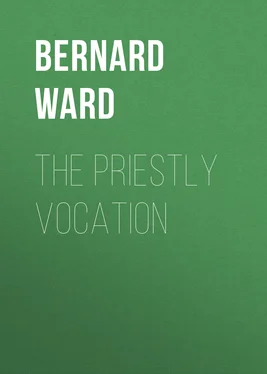Bernard Ward - The Priestly Vocation
Здесь есть возможность читать онлайн «Bernard Ward - The Priestly Vocation» — ознакомительный отрывок электронной книги совершенно бесплатно, а после прочтения отрывка купить полную версию. В некоторых случаях можно слушать аудио, скачать через торрент в формате fb2 и присутствует краткое содержание. Жанр: foreign_prose, foreign_religion, Философия, foreign_psychology, foreign_antique, на английском языке. Описание произведения, (предисловие) а так же отзывы посетителей доступны на портале библиотеки ЛибКат.
- Название:The Priestly Vocation
- Автор:
- Жанр:
- Год:неизвестен
- ISBN:нет данных
- Рейтинг книги:3 / 5. Голосов: 1
-
Избранное:Добавить в избранное
- Отзывы:
-
Ваша оценка:
- 60
- 1
- 2
- 3
- 4
- 5
The Priestly Vocation: краткое содержание, описание и аннотация
Предлагаем к чтению аннотацию, описание, краткое содержание или предисловие (зависит от того, что написал сам автор книги «The Priestly Vocation»). Если вы не нашли необходимую информацию о книге — напишите в комментариях, мы постараемся отыскать её.
The Priestly Vocation — читать онлайн ознакомительный отрывок
Ниже представлен текст книги, разбитый по страницам. Система сохранения места последней прочитанной страницы, позволяет с удобством читать онлайн бесплатно книгу «The Priestly Vocation», без необходимости каждый раз заново искать на чём Вы остановились. Поставьте закладку, и сможете в любой момент перейти на страницу, на которой закончили чтение.
Интервал:
Закладка:
It is probable that as time went on, and such work was more and more needed, priests would have been found ready to undertake them; but it may be admitted that such ideas did not occupy a large part of the mind of the average priest of the day.
With respect to the Regular Clergy, many of the above limitations affected the character of their work in similar manner; but they had perhaps better means of combating them. They lived indeed outwardly the same lay life as a secular priest; but at fixed intervals they had to retire abroad to their monasteries and live the regular life for a time; and even when living in England as chaplains to the gentry, or in out-of-the-way country missions, they were able to keep some part at least of their rule. With the Jesuits this was especially the case, as their rule does not include reciting Office in choir, and is in fact specially adaptable to the conditions of a missionary priest. From the fact that they lived outwardly as the seculars, and were occupied over the same missionary work, while they had the advantage of a longer and more complete training, and continued it on the mission by the observance of their rule, which gave them greater opportunities of becoming spiritual men, they became more highly esteemed by the majority of the laity; and the feeling grew up that their vocation was the same as that of a secular priest, but that their rule caused them to live up to it better. They were looked upon as on a higher plane; a feeling which continued long after the circumstances which had led to it had been substantially modified. Even the secular priests themselves seemed to acquiesce in it, and though they were jealous of their own rights in matters ecclesiastical, they were often ready to hand over the more difficult work to the Regulars, and seemed to assume that the latter were the more experienced confessors or spiritual advisers, and that they were leading a higher life than themselves. It was the persistence of this idea which Cardinal Manning felt called upon to combat; and in order to combat the idea, the most direct method was to destroy the inequality of training which had given rise to it. We can quote his own words:— 1 1 Life of Cardinal Manning, ii. p. 784.
"My first thought was that no Provincial or Father General had any obligation to multiply and perfect his Order greater or more absolute than I had to multiply and to perfect the priesthood of the diocese of Westminster. . . . What was the esteem in which the laity held them? They, with exceptions, were held to be at a disadvantage as compared with the Regulars: as preachers, confessors, directors, judges of vocation, advisers in spiritual and even in worldly things they were held to be of less esteem. Many of them no doubt were so. But the whole as such was higher in parts. On the other hand, many of the Regulars, with longer training and greater advantages, were better qualified than the priests of the diocese; but many were not so. And yet the laity took for granted that the clergy were 'seculars' and spoke of them as such. 'He is only a secular priest' was often heard, and it revealed a whole world of prejudice, depreciation and mistrust. This was bad enough, but there was worse to come. The priesthood accepted the depreciation which depresses and paralyses the will. A conquered people lose the sense of power, and what is worse, take their state as a standard; so that priests have come to plead against invitations and exhortations to higher things. 'I am only a secular priest.' What can be greater than a priest? For itself does it not contain all perfection? What can black or white or brown cloth add to it? This seemed to me to be the first thing wanting. The world is governed by ideas, and the idea of our Lord's priesthood, truly and fully conceived, has a motive power to raise men to anything.
"The first thing needed, as it seemed to me, was to bring out into the clearest light what the priesthood is. It seemed to me to be obscured by the traditional prejudice that to be a Regular is to be everything, and to be a priest is to be functionary for sacraments and ceremonies. Even the priesthood of the Regular was lost sight of in his Order, habit and privileges.
"This conviction was the motive of all that I did and wrote at Bayswater. And more explicitly since 1869 in St. Thomas's Seminary and in two books, The Pastoral Office and The Eternal Priesthood. "
It is no disrespect to the memory of so great a man as Cardinal Manning, to say that like most men who pursue one great idea, he went somewhat to extremes in working for his object. It is well known that he discouraged or at times even prohibited the Regulars from giving missions or retreats, in order to induce his clergy to do so instead. He endeavoured to abolish the very name of a secular priest, as being identified in the minds of many with low ideals and aspirations, and preferred the name "diocesan clergy." He insisted that they had a better right than the Regulars to the title "Father" which from his time began to be applied to them, after the manner in vogue in Ireland; and this change has become so permanent that the old title of "Mr." would to-day sound quite strange. Many of his clergy rose to the occasion, and undertook work which they had before looked upon as outside the scope of their vocation; and they soon achieved great success in it. Let Cardinal Manning himself bear witness to this:– 2 2 Ibid. p. 785
"The next aim I had," he writes, "was to make the priests of the diocese conscious of their own power as priests. . . . It forced itself upon me that dormant powers diminish, faculties in activity are enlarged, energies exerted continually grow in strength. Why then, I asked, should our priests always ask others to preach for them, to give Missions and Retreats? Is it because they know themselves to be incapable? or because they have come to believe themselves to be incapable, because the laity so regard them? Is it true? If so, in nomine Domini let us wipe away this reproach as speedily as ever we can. Is it that our priests are discouraged and believe themselves to be what is said of them? At all events the way to cure this incapacity is to do the things of which they are told that they are incapable. Let them preach, give Missions and Retreats, 'Use legs, have legs.'
"I have therefore encouraged them to give parochial missions, which have greatly prospered; chiefly to the priests themselves. Many have told me that they had no knowledge they possessed such power over their people; that in giving the missions a new light and strength came to them, and a new piety came to their people. They had never before made a full trial of the priesthood, and of the powers dormant in it."
Читать дальшеИнтервал:
Закладка:
Похожие книги на «The Priestly Vocation»
Представляем Вашему вниманию похожие книги на «The Priestly Vocation» списком для выбора. Мы отобрали схожую по названию и смыслу литературу в надежде предоставить читателям больше вариантов отыскать новые, интересные, ещё непрочитанные произведения.
Обсуждение, отзывы о книге «The Priestly Vocation» и просто собственные мнения читателей. Оставьте ваши комментарии, напишите, что Вы думаете о произведении, его смысле или главных героях. Укажите что конкретно понравилось, а что нет, и почему Вы так считаете.












